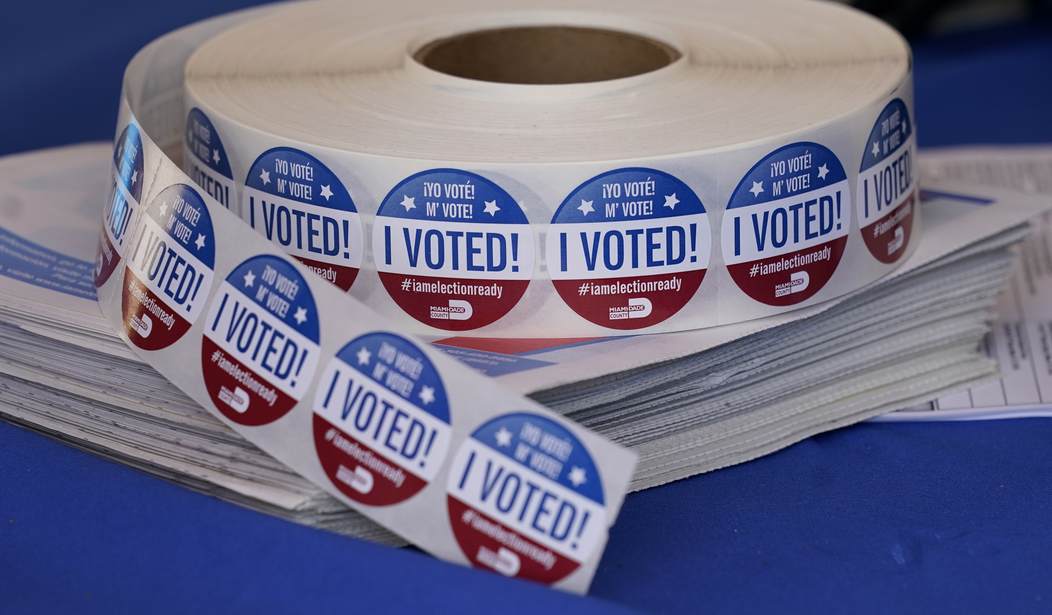On Tuesday, President Joe Biden appeared in Atlanta where he engaged in a stunningly dishonest speech concerning nuking the filibuster and passing voting legislation, supposedly in the name of saving democracy.
As has been a theme for Democrats and their mainstream media allies, Biden repeatedly referenced the Capitol riot of January 6 and connected it to states passing voter integrity laws. Biden and Vice President Kamala Harris' appearance was "to make clear what must come after that dreadful day when a dagger was literally held at the throat of American democracy," the president claimed.
Biden also warned that "victory was not certain, nor is democracy's future." He went on to say "that's why we're here today to stand against the forces in America that value power over principle, forces that attempted a coup — a coup against the legally expressed will of the American people — by sowing doubt, inventing charges of fraud, and seeking to steal the 2020 election from the people" and claimed that "they want chaos to reign. We want the people to rule."
During a media call with Heritage Action for America's Executive Director Jessica Anderson and Honest Elections Project Jason Snead, both condemned such a narrative connecting to January 6, with Anderson referring to it as "so divisive," "very dangerous," and something that has "just added more flame to that fire," with it amounting to "partisan mudslinging" and one that "pit[s] American against American."
Throughout the call, Anderson stressed that Biden and the Democrats seeking to have a focus on narrative rather than actual policy provisions in election integrity laws is particularly problematic. When it comes to that January 6 focus, she said this is "the latest example of [the left] trying to stoke their far left based as opposed to going back to the issues."
Recommended
Snead also voiced his concerns about the long-term consequences of the health of our democracy when it comes to such narratives, warning that Biden's speech repeatedly miscategorized state election integrity laws.
A consistent point raised from both Anderson and Snead was their concerns with Biden's speech on Tuesday. According to Anderson, the theme of Biden's speech had to do with "twisting facts of what Americans want." And, while President Biden ran on unity, something he's often reminded the American people, Anderson pointed out he's "gaslighting America" instead.
Wednesday also brought the release of a POLITICO/Morning Consult poll, as highlighted in the morning's Playbook edition.
While the White House and Senate Democrats claim elections is the top issue, the poll shows otherwise. From Playbook:
However, electoral reform in general is not a top issue of concern for the public right now. We asked voters which of three voting reform ideas should be “the top priority” for Congress to pass: reforming Congress’ role in counting Electoral College votes, expanding voting access in federal elections or expanding oversight of states’ changes to voting practices. “None of the above” (32%) beat out all of them.
This isn’t surprising. Political reform can be arcane and difficult to follow, and it is rarely as important to voters as bread-and-butter issues like the economy, national security and education.
Specific results indicated that 20 percent wanted "the top priority for the U.S. Congress to pass" to be "Reforming Congress' role in counting Electoral College." Twenty six responded that it should be the priority when it comes to "Expanding voting access in federal elections" and 22 percent said "Expanding oversight of states' changes to voting."
The poll showed that a strong plurality, 40 percent, said their top issue was "Economic Issues," while 15 percent said "Security Issues," and 12 percent said "Health Care Issues."
When it comes to the nuances of provisions included in the John Lewis Voting Rights Act, the poll claims many enjoy support. Quite noticeably missing, though, is a question on voter ID. Among other things, the bill would get rid of voter ID laws that are common nationwide, which is one way the law amounts to a federal takeover of elections.
As Anderson referenced, a strong majority of voters, 85 percent, support voter ID laws. Anderson also pointed out that states like Georgia increased early voting access with such legislation, which 65 percent support according to the POLITICO/Morning Consult poll. More liberal states offer fewer or even no early voting days, including Biden's home state of Delaware. Throughout the call, Anderson stressed that policy is more important than the concerning narrative Biden and Democrats are pushing.
The poll did not merely address such voting legislation, though, but another pet project of Democrats to change democracy, which is nuking the filibuster. The results of supporting or opposing the filibuster amounted to a statistical tie.
The question read, "As you may know, the Senate has 100 members representing the 50 states. Which of the following comes closest to your opinion, even if neither is exactly right?" Respondents were offered the options of "Bills in the Senate should be required to have at least 51/100 votes to pass," which enjoyed 40 percent, while "Bills in the Senate should be required to have at least 60/100 votes to pass" enjoyed 41 percent.
As Senate Majority Leader Chuck Schumer (D-NY) indicated earlier this month in a "Dear Colleague" letter, the body will vote on changing the Senate rules in order to get such voting legislation passed. In addition to also referencing January 6, Schumer referenced January 17 as the date to act, which is a federal holiday celebrating Martin Luther King Jr. Day. The latest scoop is that the Senate will still go through with such a vote next Monday, even though it doesn't have enough support.
A silver lining Anderson noted is that they are expecting even more action from states with their future election integrity laws.

























Join the conversation as a VIP Member